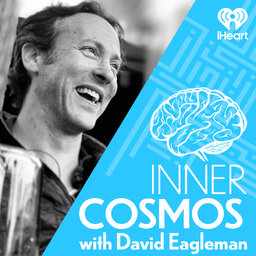Ep74 "Why do we laugh?"
From the brain’s point of view, what is humor? When something is funny, why do we breathe in and out rapidly? Do other animals laugh? Why do most jokes come in threes? What do mystery novelists, magicians, and comedians have in common? Could AI be truly funny? Join Eagleman this week to appreciate the tens of reasons and millions of years behind the tickling of your neural pathways.
In 1 playlist(s)
Inner Cosmos with David Eagleman
Neuroscientist and author David Eagleman discusses how our brain interprets the world and what that …Social links
Follow podcast
Recent clips

Ep136 "Why do we care about mattering?" with Rebecca Goldstein
41:31

Ep135: What does neuroscience mean by hypnosis? with David Spiegel
55:16

Ep82 Re Broadcast "Why Do Your 30 Trillion Cells Feel Like a Self?" Part 1
29:29
 Inner Cosmos with David Eagleman
Inner Cosmos with David Eagleman